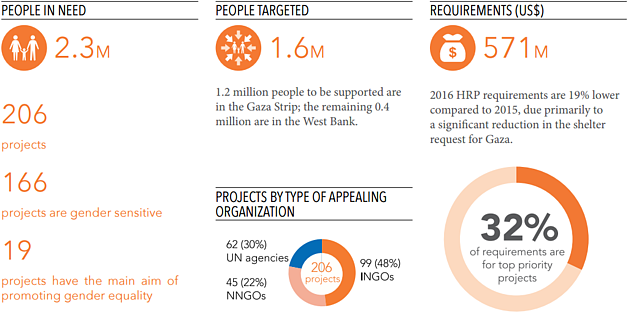2016 Humanitarian Response Plan launched
1.6 million vulnerable Palestinians targeted for assistance again in 2016
The 2016 Humanitarian Response Plan (HRP), an inter-agency plan coordinated annually by OCHA, plans to support one in three Palestinians with some form of humanitarian assistance in the coming year. It includes 206 projects worth $571 million, 19 per cent less than the sum requested in 2015, primarily due to the decrease in shelter requests for Gaza. The HRP will be launched locally in February 2016 by the Humanitarian Coordinator in coordination with the government of the State of Palestine.
This is part of the 2016 Global Humanitarian Overview launched in Geneva on 7 December 2015 by the Emergency Relief Coordinator, Stephen O’Brien. A record $20.1 billion is being requested to fund humanitarian operations around the globe in 2016. Although it shares many of the features of other operations around the world, the context of the OPT is unique - a protracted protection crisis that stems from the impact of a military occupation approaching its 50th anniversary.

Seventy-nine organizations are participating in the 2016 plan for the OPT: 12 UN agencies, 36 international NGOs and 31 national NGOs. At least 65 per cent of project requirements are for Gaza. Approximately one third (32 percent) of funds requested are for top priority projects. Given the strong protection focus of the HRP, many projects fall into this category.
The HRP aims to:
- Protect the rights of Palestinians under occupation in accordance with international humanitarian law (IHL) and international human rights law (IHRL).
- Ensure access to essential services for the most vulnerable
- Strengthen the ability of acutely vulnerable households to cope with protracted threats and shocks.
Interventions under the first objective will include monitoring and documenting violations and advocating respect for IHL and IHRL; legal assistance; removal of explosive remnants of war (ERWs); and services for women affected by gender-based violence. Under the second objective, the targeted beneficiaries will be provided with a basic level of water, sanitation, education, health and adequate shelter. Interventions a basic level of water, sanitation, education, health and adequate shelter. Interventions under the third objective will help Palestinian households struggling to cope with the chronic impact of conflict and occupation by providing food and cash assistance, rental cash and temporary shelter (for IDPs in Gaza), livelihood support and psychosocial care.
Planned interventions will integrate four key cross-cutting principles:
- Community engagement, involving communication with communities and accountability towards affected populations.
- Disaster risk reduction to ensure that people, communities, organizations and authorities are better able to anticipate and respond to shocks.
- Gender sensitivity, which takes into account the specific vulnerabilities of women, men, girls and boys.
- Sustainable solutions, internalizing that humanitarian assistance is temporary and not a substitute for development and political action.
Prompt funding for HRP projects is needed to ensure that the humanitarian situation does not deteriorate. The Humanitarian Pooled Fund (HPF) for the OPT will continue to be a source of funds for top priority HRP projects; in 2015, the HPF provided nearly $4.5 million towards HRP projects. The goal in 2016 is to raise $20 million for the HPF to enable the fund to make a greater strategic impact.









